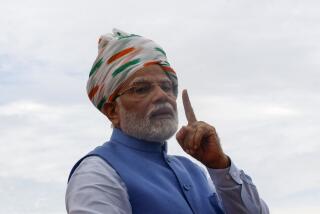GOVERNMENT HAD CONDEMNED SHOW : BBC TO AIR TERRORISM DOCUMENTARY
- Share via
LONDON — The troubled British Broadcasting Corp. restored some of its damaged credibility Thursday with an announcement that a television documentary on terrorism it had withdrawn last month under government pressure will be shown in October.
The announcement, made in the form of a joint statement by the BBC’s senior management and its Board of Governors, appeared to resolve what has been called the deepest crisis in the BBC’s 58-year history.
Although the BBC director general, Alasdair Milne, had promised earlier that the documentary, which deals with political extremism in Northern Ireland, would be shown, many of the BBC professional staff had regarded his statement as an empty gesture because no date was attached.
Some of the staff had threatened to take action, including a newspaper advertising campaign, to force the showing of the documentary.
“The Board of Governors now believes that the general climate is such that an early showing of the program is acceptable,” the Thursday statement said. It was read as the main news item on the BBC evening newscast.
The decision to withdraw the film came after Prime Minister Margaret Thatcher and then-Home Secretary Leon Brittan condemned it. The withdrawal led to charges of censorship and a one-day strike that halted all news and current-events programing--domestically and for a world BBC radio audience estimated at 120 million.
The government-appointed governors, who have the ultimate responsibility for the BBC’s program content, had called the documentary “a flawed program.” They said it highlighted the cause and a leading figure of the outlawed Irish Republican Army and had not adequately shown the effects of its campaign of violence.
The government’s tough statements, especially from Brittan, who said the program “lent succor” to terrorism, left little doubt that the governors had reacted mainly to government pressure.
Brittan’s dismissal earlier this week in a Cabinet shake-up was believed to be due in part to his handling of the BBC incident.
Milne, the BBC director general, had threatened to resign over the issue but stayed on, he said, after being given assurances of complete editorial freedom and a promise that the governors would no longer view any program before it is broadcast.
Milne said he agreed that the documentary was not properly balanced and that a carefully prescribed system of approvals required prior to BBC contacts with political extremists had not been followed.
Both of those points were addressed in the Thursday announcement. It said that BBC’s Northern Ireland station, which produced the film, had not obtained the required internal approval. It also said that amendments originally required for the program by the Board of Management had been dealt with and the program was now ready for transmission.
“They (the governors) have therefore agreed with the director general that it should be transmitted during the second half of October,” it said.
Officials of Britain’s National Union of Journalists, who organized the strike last month and had talked of additional action if the documentary were not shown soon, expressed satisfaction with the statement.
“The right decision has been made,” said Vincent Hanna, a member of the union’s national executive. “It was a sad incident in the BBC’s history.”
More to Read
Sign up for Essential California
The most important California stories and recommendations in your inbox every morning.
You may occasionally receive promotional content from the Los Angeles Times.










